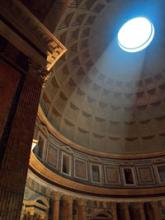2010 Exploration Seminar in Italy
Program Directors:
Claudio Mazzola (Italian) & Jose Alaniz (Slavic Languages and Literatures)
Dates of Instruction: August 27th-September 24, 2010
External Webpage: http://depts.washington.edu/explore/programs/2010/italycinema.htm
This seminar explores Rome and its historical significance as the western world’s “Eternal City” through the aspect of film and space. Given the cinema’s capacity to utilize the constant change and movement of images as a formal principle, it bears a unique relationship to the complexity of perception inherent to the flow of urban space. Tracing cinematic representations of Rome from the 1950s to the present, this seminar juxtaposes American cinema’s “stable” portraits of the city with a tradition of Italian filmmaking that alternately maps what we call “uncertain” space—a volatile, culturally conflicted, and highly contingent urban landscape.
The ample auditorium and screening facilities at the UW Rome Center will serve as our central classroom, and we will watch approximately eight movies. Our other classroom will be situated on the streets of Rome, and we will trace (by walking and by mass transit) the various spatial maps virtually produced in the films under discussion. We will initially focus on the central district and on familiar tourist itineraries—the Vatican; St. Peters, The Fountain of Trevi, etc.—flaunted as iconic sites of meaning in the work of William Wyler and Jean Negulesco among other American and British filmmakers. We will consider how cinematic strategies that combine a static frame with continuity editing techniques generate a virtual map of the city’s visually intoxicating structures which our walking tours will force to us rethink. We will then turn to a tradition of Italian filmmaking, ranging from the work of Vittorio De Sica and Roberto Rosselini to Federico Fellini and Pier Paolo Pasolini among others, whose films provide diverse itineraries of the working-class suburbs and the old popular center that we will track in the remainder of the seminar. The concept of “tracking” deserves emphasis here, since the mobility of the camera and the relentless tracking shots that galvanize a volatile cinematic landscape in these films also produce a complex statement about the ambiguity of reality in differing historical and cultural contexts.
CREATING FRAMES: The ambiguity of our position as both “foreigners” and “students” in Rome generates a unique perspective that we will reflect upon through a series of creative exercises. All seminar participants will produce an array of sketches, photomontages, and written descriptions reflecting their spatial and affective experiences of our group excursions as well as their individual experiences while living in Rome. Some students may wish to pursue these individual projects through the duration of the seminar, and generate a portfolio that “frames” Rome in a variety of perspectives for their final project. Another option will allow interested students to collectively storyboard, shoot, and edit a short “city film” of our own making.
Ultimately, the purpose of this seminar utilizes moving images to assess the shifting relationship between perception and meaning, history and culture, aesthetic systems and urban experience. The idea is to explore first-hand the role of film and visuality in framing our view of Rome.
TARGET AUDIENCE: This Exploration seminar is open to all graduate and undergraduate students with or without knowledge of Italian. The language of instruction will be English but separate sessions will be held for those who wish to work in Italian.
CREDITS: Participants may earn 5 credits for Fall Quarter of either ITAL 499 (VLPA), 399 (VLPA) or CLIT 397 (VLPA) or 315 (VLPA).
Student costs:
- $3,600 Program Fee
- $ 250 International Programs & Exchanges Fee
- Click here for a Estimated Budget of Student Expenses (for financial aid requests)
- Program fee includes: lodging in apartments with other UW students, bus pass while in Rome, access to the UWRC including the computer’s room, a week end field trip to a destination to be announced later.
- Additional costs include: International travel to and from Rome, food, health insurance, books, visa and/or passport expenses, personal spending money.
** Please note that an Italian study visa is required for this program. If accepted to the program, the office of International Programs and Exchanges will assist you with the process of applying for a visa. Visa applications will be due sometime at the end of May 2010 and will be processed via IPE at the Consulate in San Francisco. As an original passport is required for a visa application, you will likely be without your passport for several months during the summer. Please plan your summer international travel accordingly. Passports must be valid for at least six months *after* your return date to the U.S. If you do not have a passport or your passport is going to expire, please renew as soon as possible.
